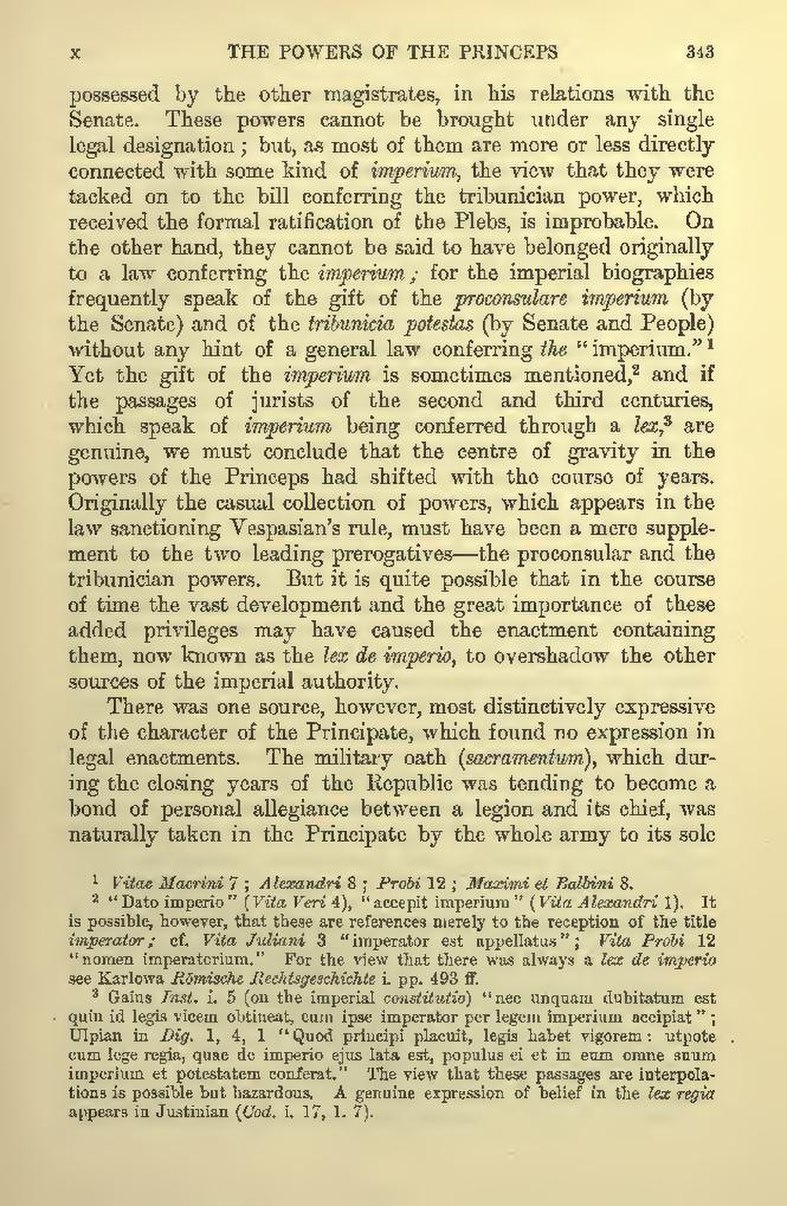possessed by the other magistrates, in his relations with the Senate. These powers cannot be brought under any single legal designation; but, as most of them are more or less directly connected with some kind of imperium, the view that they were tacked on to the bill conferring the tribunician power, which received the formal ratification of the Plebs, is improbable. On the other hand, they cannot be said to have belonged originally to a law conferring the imperium; for the imperial biographies frequently speak of the gift of the proconsulare imperium (by the Senate) and of the tribunicia potestas (by Senate and People) without any hint of a general law conferring the "imperium."[1] Yet the gift of the imperium is sometimes mentioned,[2] and if the passages of jurists of the second and third centuries, which speak of imperium being conferred through a lex,[3] are genuine, we must conclude that the centre of gravity in the powers of the Princeps had shifted with the course of years. Originally the casual collection of powers, which appears in the law sanctioning Vespasian's rule, must have been a mere supplement to the two leading prerogatives—the proconsular and the tribunician powers. But it is quite possible that in the course of time the vast development and the great importance of these added privileges may have caused the enactment containing them, now known as the lex de imperio, to overshadow the other sources of the imperial authority.
There was one source, however, most distinctively expressive of the character of the Principate, which found no expression in legal enactments. The military oath (sacramentum), which during the closing years of the Republic was tending to become a bond of personal allegiance between a legion and its chief, was naturally taken in the Principate by the whole army to its sole
- ↑ Vitae Macrini 7; Alexandri 8; Probi 12; Maximi et Balbini 8.
- ↑ "Dato imperio" (Vita Veri 4), "accepit imperium" (Vita Alexandri 1). It is possible, however, that these are references merely to the reception of the title imperator; cf. Vita Juliani 3 "imperator est appellatus"; Vita Probi 12 "nomen imperatorium." For the view that there was always a lex de imperio see Karlowa Römische Rechtsgeschichte i. pp. 493 ff.
- ↑ Gaius Inst. i. 5 (on the imperial constitutio) "nec unquam dubitatum est quin id legis vicem obtineat, cum ipse imperator per legem imperium accipiat"; Ulpian in Dig. 1, 4, 1 "Quod principi placuit, legis habet vigorem: utpote cum lege regia, quae de imperio ejus lata est, populus ei et in eum omne suum imperium et potestatem conferat." The view that these passages are interpolations is possible but hazardous. A genuine expression of belief in the lex regia appears in Justinian (Cod. i. 17, l. 7).
